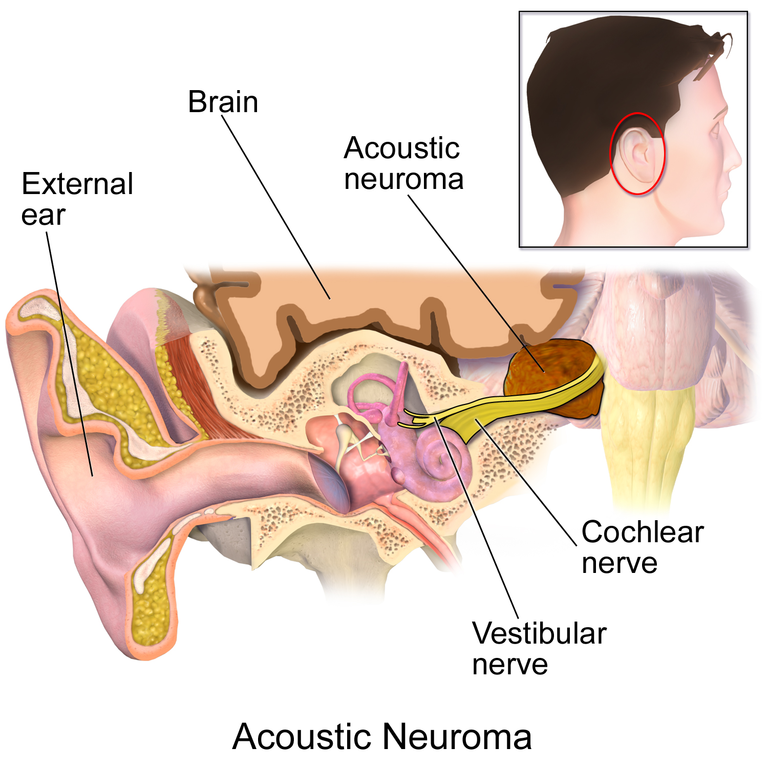What is an Acoustic Neuroma?
An acoustic neuroma is a benign tumour that develops on the nerves connecting the inner ear to the brain. It represents about six to ten per cent of all brain tumours. These tumours are not malignant and do not spread to other parts of the body.
Acoustic Neuroma Symptoms
The first symptoms of acoustic neuroma are usually a nerve hearing loss (known as sensorineural hearing loss), often in only one ear, and paired with tinnitus (ringing in the ear). Hearing loss is usually progressive but can be sudden and dramatic in about one per cent of cases. This hearing loss can be accompanied by balance issues, leading to a tendency to veer or stagger.
As the tumours grow, they can cause the brainstem (where the brain meets the spinal cord) to compress or fluid to build up. Tumours are potentially lethal if they are not removed from these vital structures.
In addition to affecting the hearing and balance nerves, the facial nerve is slowly stretched over the tumour, affecting the function of facial muscles. Other nerves can also be compressed, including the nerve that controls face sensation, the voice box and the swallowing nerves. Acoustic Neuroma neck pain symptoms are also commonly reported.
An acoustic neuroma is generally a slow-growing tumour. In some cases, the growth rate is more rapid, but this is rare. The growth pattern of acoustic neuroma is challenging to predict.

Acoustic Neuroma Causes
About 95% of all acoustic neuromas occur only on one side; in most cases, the cause is unknown. It does not appear to be associated with a family history. In around 5% of cases, acoustic neuroma symptoms may occur on both sides. These cases are predominantly due to a hereditary condition called Neurofibromatosis type II (NF II). NF II is a rare disease occurring in approximately one in 100,000 people.
Acoustic Neuroma Diagnosis
During a routine hearing test, a one-sided nerve hearing loss can lead to a suspicion of an acoustic neuroma. However, they cause only a small percentage of one-sided hearing losses. As a precaution, your audiologist may recommend further investigation, including an acoustic neuroma MRI ordered by your GP, to rule out the possibility of an acoustic neuroma. An acoustic neuroma is best diagnosed with an MRI scan, though some tumours may be diagnosed with a CT scan.
Other tests are sometimes required, including balance, central hearing, and preoperative blood tests.
Acoustic Neuroma Treatment
Treatment for acoustic neuroma requires careful consideration by experts.
Factors that can influence the treatment include tumour size, growth rate (sometimes estimated from several MRI scans over a time), the patient’s age and general health, and the hearing levels in the affected and unaffected ear.
The three primary treatment strategies are
- Observation
- Acoustic Neuroma Surgery and radiotherapy, or
- With a combination of these strategies,
Acoustic Neuroma Surgery is usually recommended for patients when the tumour compresses the brain stem. Surgery to preserve hearing may be recommended if the tumour is small and the patient still has some hearing. Small tumours in older patients may be observed long-term, and growth may be monitored over MRI scans. Other tumours may be treated by radiotherapy.
Preserving hearing and treating hearing loss
In the past, acoustic neuroma surgery generally resulted in the loss of all hearing in the affected ear.
In more recent years, depending on the size and location of the acoustic neuroma, surgeons have been able to remove and treat the acoustic neuroma while preserving the acoustic nerve. In these cases, it may be possible to get a cochlear implant to treat the hearing loss, which can be implanted during the same surgery


